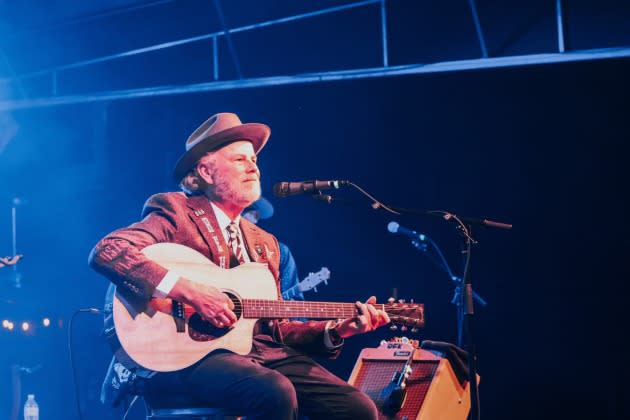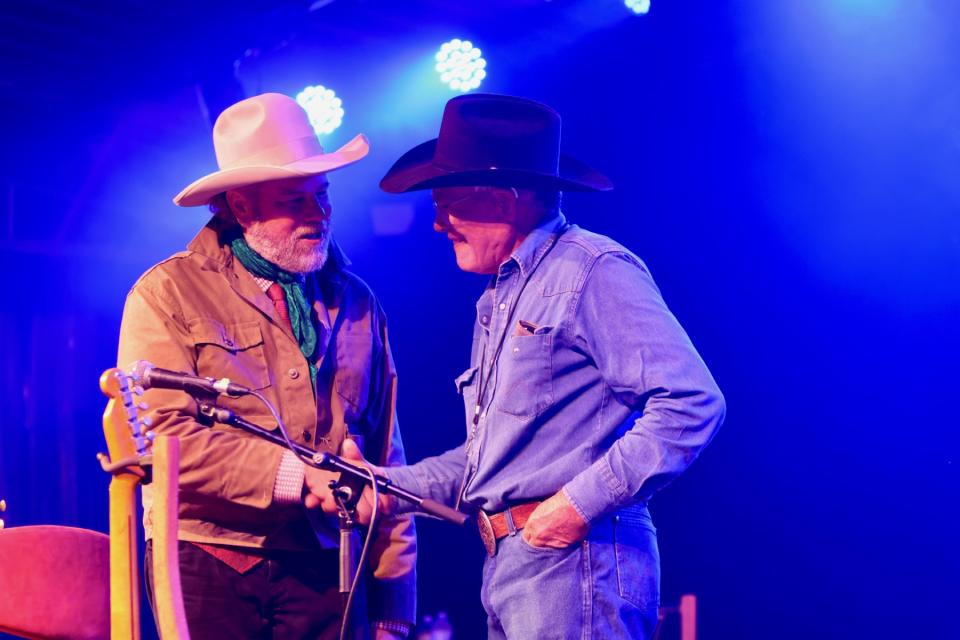Robert Earl Keen Has Played His Final Show. He’s Not Kidding

It is difficult to envision the moment playing out any other way.
Robert Earl Keen, seated onstage at Floore’s Country Store in Helotes, Texas, had been playing for 3,000 people for nearly two-and-a-half hours. Only a single chorus remained between him and retirement after 41 years of playing shows. The Americana icon is 66 and had spent nearly all of his 2022 I’m Coming Home Farewell Tour playing from a chair after a series of health woes made standing for an entire concert all but impossible. But now, a real goodbye was upon him.
More from Rolling Stone
'They Called Us Outlaws' Documentary Tells the Story of Country's Rebel Period
Sturgill Simpson, Eric Church Cover John Anderson on New Tribute Album
The Road Goes on Till September: Robert Earl Keen Talks Surprise Retirement
Keen grabbed his guitar, ditched his chair and rose to his feet. The diamonds on his maroon sport jacket — they spelled “REK” on the front and “the party never ends” on the back — sparkled under the stage lights. He walked across the stage, microphone to microphone, singing the chorus of “I’m Coming Home,” one of his many defining songs, while the crowd joined in.
He returned front-and-center to deliver his final line, his voice somehow both rich and cracking at the same time: “Packed my suitcase, I racked my brain. Bought a ticket on a late-night train. I took a taxi through the pouring rain.”
Then, Keen set down his guitar, tipped his hat twice, took a bow, turned to his left, and walked off stage as a headliner for the final time.
Keen, who announced his retirement from the live stage in April, performed three shows over four nights at Floore’s. On Saturday, the penultimate show, Eric Church and James McMurtry opened. Rodeo champ Phil Lyne, Keen’s childhood hero, made a rare appearance. Keen read a speech in which he revealed he’d been battling health issues — a chronically bad back, Bell’s palsy — and openly wept when introducing Lyne.
He also documented the recent road, much of it unrelentingly bumpy, that led to this final moment: Keen’s back medication caused an allergic reaction, band members were injured, his bus caught fire in New Orleans. “But, by God, we made it here tonight,” he said Saturday.
If Saturday’s concert registered as emotional, then Sunday’s was off the chart. Keen played 29 songs, six of them as an encore. As has been the theme of his final tour, there was a snafu: after he was introduced, power to the main speakers went out, leaving Keen and his bandmates to stand side-stage for more than 30 minutes while the production crew fixed the issue.
But when he finally began playing, fans got the sense that all of this was exactly the ending Keen had wanted.
“Sorry for the technical glitch, but we wanted to get things exactly right for once in my career,” Keen joked. He opened the night by combining “Amazing Grace” with his own “A Border Tale,” and then took the concert at his own pace while the capacity audience stood, cheered, and sang along. Keen drew heavily from his seminal 1996 live album, No. 2 Live Dinner, which long ago cemented him in Floore’s lore.
There were tears, but more so there were shouts of pure, last-chance-in-a-lifetime joy, however bittersweet it may have been for Keen’s loyal fans.
When someone in the crowd begged him not to retire, Keen quashed any possibility of a comeback. “Have you ever heard that all good things must end?” he shot back with a grin. (On Saturday, he stated, “I want to clarify a few things: I am not Tom Brady.”)
Still, Keen relished the spotlight. “I’d just like to say, this playin’ music thing is fun!” he said at one point, introducing his band for the last time: guitarist Noah Jeffries, fiddler Brian Beken, bassist Bill Whitbeck, and drummer Tom Van Schaik. Legendary pedal-steel player Lloyd Maines also sat in, at the request of Keen, who recruited all of the weekend’s opening acts. Kevin Galloway of Uncle Lucius kicked things off Thursday, Church and McMurtry on Saturday, and David Beck’s Tejano Weekend and Cody Canada & the Departed on Sunday.
“When I heard his music for the first time, he made me realize that I wanted to be a folk hero instead of a rock star,” Canada told Rolling Stone afterward. “He is about the music and the band, not about ‘look at me.’ And that’s who he made me want to be.”
“I grew up in North Carolina,” Church said onstage Saturday. “And when I was in college, one of the first records that was ever given to me was by one of the musician friends that I looked up to. He passed me the No. 2 Live Dinner record. And he said, ‘Young blood! Listen to me. This is what you need to learn right here.’ And, well, shit, I learned it all. And I can play it all.”
Naturally, the loudest cheer of Sunday night came during the last song before the encore break, “The Road Goes on Forever (And the Party Never Ends),” when it was time for the crowd to sing the chorus back to Keen for one final time. He led off the encore with a pair of biting solo acoustic songs: “The Road Goes On and On,” Keen’s only known diss track, and the kiss-off “Unfriended.” “I’ve got this guitar here. It’s Jerry Jeff Walker’s guitar,” he said afterward, a reference to the late architect of outlaw-country. “And I think he would have been real proud of those songs!”
Then, he played two more covers. He introduced Steve Earle’s “My Old Friend the Blues” with a hilarious tale about receiving some questionable advice from Earle. Following that, he shouted out his daughter, Chloe, for being the only person who can still introduce him to new music, then plowed his way through a cover of ironic indie-rocker Oliver Tree’s “Cowboys Don’t Cry.”
For the send-off, Keen returned to his catalog with “I’m Coming Home,” allowing himself a curtain call four decades in the making. And then it was over.
“I’ve been doing shows with Robert here for 20 years, and going to his shows for another 10. So, it’s a little bit surreal right now,” Mark McKinney, the current owner of Floore’s, told Rolling Stone. “I can’t even imagine a world without Robert Earl Keen shows in it.”

While Keen addressed the crowd regularly on Sunday night, it was his speech on Saturday that best summed up his mindset ahead of retirement. Titled “My Hero Has Always Been a Cowboy,” it paid tribute to the 75-year-old Lyne, who walked away from rodeo glory after being crowned the 1971 and 1972 National Finals Rodeo all-around champion.
Here’s the complete transcript of Keen’s speech:
When I announced my retirement, I had nostalgic visions of celebration and well-wishes.
Through the winter tour, we played a string of shows we had not experienced in years. We performed a heartfelt tribute to my mentor, Nanci Griffith. And, thanks to my friend Tyler Childers, we raised over $400,000 for the Hill Country Youth Orchestra.
We were on a roll, until suddenly, my back gave out. I went to doctor after doctor. The meds I received triggered a series of allergic reactions. My feet and legs were swollen to the point that wearing boots was impossible. My weight fluctuated from 210 pounds to 185 pounds in 10 days. We canceled our mid-May plan to record a new studio album.
My poor health became undeniably visible, which created tremendous doubt for all of us, but most of all, our beloved fans. That’s you.
That same month, our bus driver’s mother died unexpectedly. And, by June 1, morale was at an all-time career low. The outset of these stressful situations touched everyone on the tour. As anxiety rose, communication weakened. I developed Bell’s palsy.
And, our fiddle player — Brian, who’s very healthy — suffered a pinched nerve. Our drummer, Tom, broke his elbow. When we thought everything was already going up in flames, our bus caught fire. But, by God, we made it here tonight.
In playing over 175 shows in the past three months, we’ve also seen good times. We’ve welcomed our new guitar player, Noah, and traveled across the nation from arenas to theaters to my favorite local hangouts like tonight at Floore’s Country Store.
It couldn’t be more fulfilling without great audiences such as yourself. That can bring us all together.
Amidst the trials and tribulations, people doubted my retirement. Like Elton John, I’d come back. Like Tom Brady … we still haven’t seen the last of him!
I had no convincing answers, so I either shrugged or mumbled something like, “You don’t know me.”
I felt like a liar. It reminded me of a girl I knew, who used to say, with all sincerity, “I live facetiously through other people.”
There was one thought that kept driving me throughout this rigorous ordeal, and that thought was branded on my brain in 1974 — my senior year in high school. I’d grown up in Houston with dreams of being a cowboy. I loved western horsemen. I listened to country music exclusively. I dipped snuff until my teeth fell out. I went to every rodeo within a hundred miles of my hometown metropolis. I was obsessed with rodeo. I built a buckin’ barrel in my backyard. And, as I’ve said before, I had a rodeo career that lasted 15 seconds. For you math majors, that’s five bulls times three seconds apiece.
And, most importantly, I became a lifetime fan of a man that I consider to this day the greatest sports hero ever. Not only was he the best of all in every rodeo event, but he was perfect. So much so that he rarely talked about his accomplishments, and this was what was branded on my brain.
When he quit rodeo, he was at the top of his game. And then, like Bobby Fischer, the world’s best chess player, he disappeared. And unlike Bobby Fischer, he never returned to challenge another or challenge himself. I thought that was the coolest, dignified exit from anything a person could accomplish. I thought, if I ever had a moment of clarity like my rodeo hero, I promised myself I would follow his lead.
At this time, I would like to introduce you to my hero, and say “thank you” for showing me the way. True to his nature, he is here tonight to stand by my side, so that you wonderful people could see this amazing man and know that heroes are real, and they inspire people without them knowing when, where, why or how.
Their own actions change lives.
My hero has always been a cowboy.
Ladies and gentlemen — he’s not gonna give you a speech, he just promised to come up here.
Ladies and gentlemen, please help me welcome right now, helping us celebrate 80 years of music at Floore’s Country Store, please put your hands together, for the one and only Phil Lyne.
[Josh Crutchmer is the author of the book Red Dirt: Roots Music, Born in Oklahoma, Raised in Texas, at Home Anywhere (Back Lounge Publishing, 2020).]
Best of Rolling Stone
